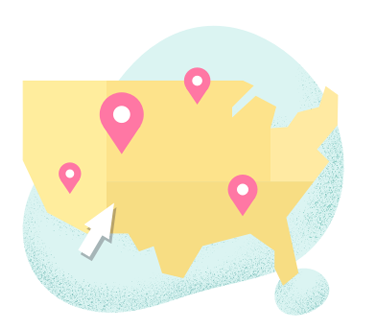How much is caregiver insurance?
The cost of insurance for caregivers depends on the types of policies and amount of coverage you choose. Insurers will also look at factors such as the services you offer and your business revenue. Save money on insurance by comparing quotes from top-rated providers with TechInsurance.
Key non-medical home health care insurance policies and their expected costs
Here are the top types of insurance policies purchased by caregivers and their average monthly costs:
- General liability insurance: $30 per month
- Medical malpractice / professional liability insurance: $12 per month
- Workers' compensation insurance: $211 per month
- Cyber insurance: $74 per month
- Commercial auto insurance: $212 per month
- Fidelity bonds: $12 per month
Our figures are sourced from the median cost of policies for healthcare companies that apply for quotes with TechInsurance. The median provides a better estimate of your expected insurance costs because it excludes outlier high and low premiums.
General liability insurance for caregivers
On average, home care businesses pay $30 per month, or $365 annually, for general liability insurance coverage—the most common type of liability insurance.
This coverage helps protect non-medical home healthcare agencies from common third-party claims involving injuries, property damage, or advertising issues. For instance, if an elderly patient slips on a wet floor and gets hurt, or if you accidentally damage a client’s belongings, general liability insurance can help pay for medical bills, repairs, or legal fees.
This policy also includes coverage for advertising injuries, such as copyright infringement, defamation, or claims of misleading marketing content.
Many landlords and clients require caregiver companies to show proof of general liability coverage before signing a lease or service contract.
Below is the average general liability policy for home care agencies that buy from TechInsurance:
Premium: $30 per month
Policy limits: $1 million per occurrence; $2 million aggregate
The per-occurrence limit is the most your insurance company will pay for a single incident, while the aggregate limit is the maximum paid for all claims during the policy term (usually one year).
TechInsurance's licensed agents often recommend a business owner’s policy (BOP), which combines a general liability insurance policy and commercial property insurance into one convenient, cost-effective package. Home health agencies with smaller practices and lower risk exposure often qualify for a BOP.
Your general liability insurance premium may vary based on factors like your location, annual revenue, number of employees, the range of services you provide, and your chosen limits and deductible.

Medical malpractice / professional liability insurance for caregivers
Non-medical home care businesses pay an average medical malpractice insurance premium of $12 per month, or $139 annually. This policy is also called professional liability insurance or errors and omissions (E&O) insurance.
Many caregivers are required to carry malpractice coverage to comply with state licensing requirements or to work in hospitals, clinics, or other healthcare settings.
Professional liability insurance helps cover lawsuits related to professional errors, missed diagnoses, or failure to meet an accepted standard of care. Even baseless or frivolous claims can lead to costly legal battles, which this policy helps cover.
For instance, suppose a client's loved one sues you or your employee for negligence over their in-home care. Malpractice insurance can help pay for attorney’s fees, settlements, or court judgments, protecting your practice from financial loss.
Below is the average malpractice insurance policy for non-medical home healthcare providers who buy from Insureon:
Premium: $12 per month
Policy limits: $1 million per occurrence; $3 million aggregate
Because malpractice insurance is typically written on a claims-made basis, you must maintain continuous coverage to remain protected. If your policy lapses, you could lose coverage for previous incidents unless you purchase tail coverage to extend protection.
One of the biggest factors affecting the cost of professional liability insurance is the type of home care services you offer, such as telehealth consultations. Other factors include your claims history, the liability limits you choose, and any additional coverage options, such as tail coverage.
Workers’ compensation insurance for caregivers
Personal care aides pay an average of $211 per month, or $2,535 per year, for workers’ compensation insurance.
This policy helps cover medical expenses, rehabilitation costs, and lost wages if an employee is injured in a client's home or becomes ill due to their job. It also includes employer’s liability coverage, which protects your practice if an injured employee files a lawsuit over a workplace incident.
Most states require businesses with employees to carry workers’ compensation insurance. The specific rules vary by location—for example, all healthcare providers in California, Pennsylvania, and New York must carry workers' comp if they have one or more employees. Florida businesses need coverage when they have four or more employees, and coverage is optional in Texas.
Even if you’re self-employed, carrying workers’ comp can protect you financially if you’re injured on the job. Standard health insurance often excludes work-related injuries, leaving you to pay out of pocket without this coverage.
Your workers’ comp premium depends mainly on how many employees you have, the type of work they perform, and your claims history. You can help lower your costs by classifying employees accurately and adopting a workplace safety program to reduce injury risks and claims.
Other factors, such as the cost of healthcare in your state, can also affect your premium.
Find workers' comp requirements in your state

Cyber insurance for caregivers
Healthcare professionals, including caregivers, pay an average of $74 per month, or $883 per year, on cyber insurance, also known as cyber liability insurance or cybersecurity insurance.
This coverage helps your non-medical home care business recover from the financial impact of a cyberattack or data breach. It can help pay for data recovery, breach investigations, notification costs, legal defense costs, and even cyber extortion payments.
Because home care agencies often store protected health information (PHI) and personally identifiable information (PII), cyber insurance is an important safeguard. It can also help you stay compliant with state data breach laws if patient data is exposed or stolen.
The cost of your cyber insurance policy depends on factors like how much sensitive data you manage, your cybersecurity controls, and your claims history. Practices that store large volumes of patient information or operate online patient portals typically need higher limits to ensure full protection.
Commercial auto insurance for caregivers
Non-medical home healthcare businesses and other medical small business owners pay an average of $212 per month, or $2,544 per year, for commercial auto insurance.
This coverage protects your practice if a company-owned vehicle is involved in an accident. It can pay for bodily injury or property damage claims, as well as legal fees if you’re sued. Many policies also cover vehicle theft, vandalism, and weather-related damage.
Most states require commercial auto insurance for vehicles owned by a business. If you use personal, rented, or leased vehicles for work, consider hired and non-owned auto (HNOA) insurance to fill coverage gaps.
The cost of commercial auto insurance depends on several factors, including your policy limits, the coverage options you choose, the number and value of your vehicles, and the driving records of anyone permitted to drive.
Fidelity bonds for caregivers
The average cost of a fidelity bond is $12 per month for non-medical home healthcare professionals, or $138 annually. Some clients may require a bond before they'll work with your home health company.
Fidelity bonds reimburse your client if one of your employees commits fraud, theft, or forgery, including illegal electronic funds transfer. However, unlike insurance, this amount must be paid back to the company that issued the bond.
The cost of a fidelity bond is typically a small percentage of the bond amount.

Even if you’ve done nothing wrong, someone can still sue your IT business. Learn how to prepare for this possibility.
Top factors impacting caregiver insurance costs
Several factors influence how much you’ll pay for caregiver or home health aide insurance. These include the nature of your work, your business structure, and your coverage choices.
- Types and level of home health care you provide: The scope of services you offer and the level of daily living assistance required can significantly affect your insurance costs.
- Types of health issues and conditions you serve: Caring for clients with complex physical or mental health conditions often involves higher liability exposure, which can increase your insurance premiums.
- Frequency and duration of care: The more often and longer you provide care, the greater your exposure to potential accidents or claims, which can raise your insurance costs.
- Value of equipment and property: If you own or use expensive devices, mobility aids, or other equipment, you may need higher property coverage limits to protect against damage or theft.
- Business location: Insurance costs can vary based on your state and city due to differing regulations, claim rates, and local labor costs.
- Number of employees: Having employees generally increases your insurance needs, since you’ll likely need workers’ compensation coverage and higher liability limits.
- Business income and size: Larger or higher-revenue caregiving businesses often need more comprehensive coverage, which can increase premiums.
- Policy limits and deductibles: Choosing higher coverage limits or lower deductibles usually results in higher premiums, while lower limits and higher deductibles can reduce costs but increase your financial risk.
- Types of policies purchased: Costs depend on whether you buy basic general liability coverage or add specialized policies such as professional liability, commercial auto, or cyber insurance.
- Years of experience: Caregivers with more experience or a strong safety record may qualify for lower rates, while newer providers might pay more initially.
- Policy exclusions: If your policy excludes certain services or risks, you may need to purchase endorsements or additional coverage, which can affect your total cost.
- Claims history: A history of frequent or costly insurance claims can make insurers view your business as higher risk, leading to increased premiums.
How do I get affordable home care business insurance with TechInsurance?
TechInsurance works with top U.S. carriers to help non-medical caregivers find the right coverage for their agencies, whether you operate solo or run a small business with multiple employees.
When you’re ready to purchase a policy, you’ll be paired with an account manager who specializes in liability insurance for caregivers. They can guide you through selecting the right policies to protect your business and get peace of mind.
For medical malpractice coverage, you can contact our dedicated insurance agent by emailing [email protected] or calling (312) 854-2919. They can help you find insurance quotes for malpractice coverage and answer any follow-up questions.
You can buy other insurance policies online with TechInsurance in three easy steps:
- Complete a free online application with your business details.
- Compare personalized quotes from top-rated U.S. insurance providers.
- Select a policy and pay the premium to begin coverage.
Our licensed agents are available to answer questions about your business risks, state insurance requirements, and ways to save on liability insurance for home aides. Most small practices can receive a certificate of insurance within 24 hours of applying for quotes.

